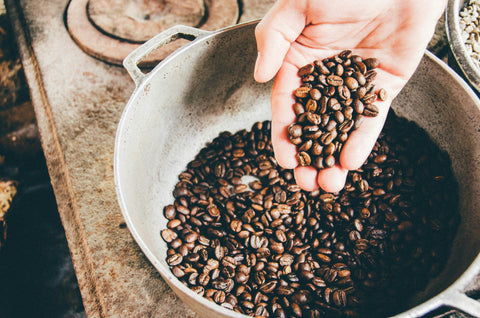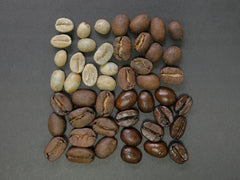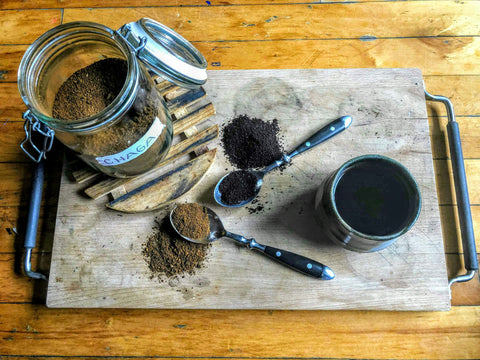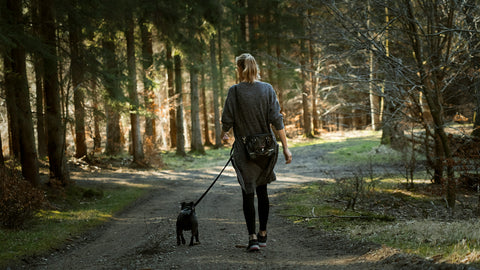Have you ever had one of those mornings where you wake up feeling ready to conquer the world only to be derailed by a jittery anxious feeling from the wrong cup of coffee? You thought you’d be more productive with a quick jolt of caffeine, but instead, you find yourself restless and unable to focus. When coffee jitters hit, it can throw off your whole day.
Fortunately, there is hope in finding coffee that won't leave you feeling wired. Whether you're sensitive to caffeine or simply seeking a smoother, more balanced brew, understanding what causes coffee jitters and how to avoid them can help you enjoy your morning ritual without the unwanted side effects.
What are Coffee Jitters

Coffee jitters are the jittery, shaky sensations that can happen after drinking
caffeine, often related to coffee. It's your body's response to caffeine's stimulating effects on your nervous system and can make you feel overly alert and anxious. The intensity of coffee jitters depends on how sensitive each person is to caffeine and the amount they consume. That’s why your chatty coworker can drink coffee all day with no issues while you may feel shaky after less than a cup. But there are other factors too, such as how the coffee was grown and what chemicals may be present in your morning brew that may be wrecking you.
If you think you've had the jitters, you’ve likely faced:
- headache or dizziness
- shakiness
- insomnia or poor sleep
- high blood pressure or a racing heartbeat
Understanding your own caffeine sensitivity and how it develops can help you make informed choices about your coffee and find the right option for your body.
What Causes Coffee Jitters
When you indulge in your daily dose of caffeine from coffee, soda, or energy drinks, you're setting off a complex chain reaction in your body. Caffeine blocks a neurotransmitter called adenosine. which normally helps us slow down nerve activity and feel more relaxed. Instead, the caffeine causes your nervous system

to rev up, releasing adrenaline and other stimulating chemicals that make you feel more alert, but may also give you a rapid heartbeat, muscle tremors, and a sense of jitteriness or restlessness.
Consuming caffeine too quickly or having too much in a short amount of time can also cause a case of the jitters. Too much caffeine too quickly can overwhelm the body's ability to metabolize it. Slow, steady consumption or spacing out caffeinated beverages throughout the day can help minimize your response.
How to Choose Coffee that Won’t Make You Jittery
If you experience the occasional jitters you don't need to give up the best part of your morning, you just need to find a coffee that works for you. There are several things to look for when you’re on the hunt for coffee that won’t give you the jitters.
- Quality of beans including how they’re grown and farmed
- Processing techniques and roasting level
- Caffeine content
- Proper storage
- Brewing methods
- Added benefits like adaptogens
Each of these will impact how your coffee tastes and how the caffeine will affect you so it’s important to know what to look for.
Start With Quality Beans
Before you even consider how to prepare your coffee, you’ll want to make sure you’re choosing high-quality beans. But what does quality mean? Higher-quality coffee beans are measured on the specialty coffee scale. This coffee often undergoes better sourcing, cleaner processing, and more mindful roasting techniques, giving it a more balanced and smoother flavor profile.
Where and how coffee is grown, harvested, and processed affects its quality. Coffee from farms with good soil, pest control, and careful harvesting tastes better and has more consistent beans. These farms also often use more sustainable

techniques like growing coffee in the shade and natural pest control instead of chemical pesticides that can find their way into your cup.
Shade-grown coffee has lower caffeine and acidity because the shade slows down the plant's growth. This means fewer jitters from the caffeine and less digestive discomfort if you have a sensitive stomach too. You'll want to look for organic, shade-grown coffee because it’s less acidic, lower in caffeine, and wasn’t grown directly in the harsh sunlight so it can be gentler on your nervous system.
Choose the Right Roast Level
How coffee is processed depends on the type of coffee being produced as it impacts the flavor, aroma, and overall quality. Washed (wet) processing involves removing the outer layers of the coffee cherry before drying the beans, resulting in slightly lower caffeine levels compared to natural (dry) processing, where the beans are dried with the cherry pulp intact. The difference in caffeine content between these processing methods is minimal, but is a factor in how the beans are roasted.
The roast level of coffee can significantly impact whether it will make you jittery. Lighter roasts generally contain more caffeine than darker roasts due to the shorter roasting time, which preserves more of the bean's caffeine content. However, lighter roasts also tend to have higher acidity levels, which can give the more intense flavor profile some people prefer.
Darker roasts undergo a longer roasting process, which reduces caffeine levels and acidity while enhancing the rich, bold flavors. If you want to avoid jitters, opting for a darker roast might be better for you. You’ll have a smoother, less acidic coffee experience with lower caffeine content.
Check for Caffeine Content
Caffeine is likely the culprit that’s causing your jitters. While caffeine is naturally occurring in coffee, you can choose how much you want in your cup when shopping for your beans. The caffeine content is affected by the roasting level, but

it's also impacted by the coffee bean variety and brewing technique.
Different coffee bean varieties naturally contain varying levels of caffeine. Arabica beans generally have lower caffeine content compared to Robusta beans, while Excelsa and Liberica beans fall somewhere in between. Arabica beans typically have the highest acidity levels which gives the coffee its bright, vibrant flavors compared to the lowest acid Robusta beans.
The choice of coffee bean variety affects both caffeine content and acidity, but things like coffee quality, serving size, and brew strength may play a more substantial role in determining whether you experience jitters. If you find you’re more sensitive to caffeine consider trying a decaf option or mix two brews to find your perfect half-caf blend.
Use Proper Storage
How coffee is stored also plays a role in whether you’ll end up with the jitters. Coffee stored improperly before purchase may have already lost some of its freshness and flavor. Exposure to light, heat, air, and moisture in the store or warehouse can lead to oxidation and degrade the coffee's compounds, potentially affecting its caffeine content and flavor profile.
Pay attention to the roast date when purchasing coffee. Opt for coffee that has been recently roasted to ensure maximum freshness and flavor. Once home, proper storage is essential for maintaining freshness and flavor. To minimize the risk of jitters, store your coffee beans or ground coffee in an airtight container away from light, heat, and moisture.
Use the Best Brewing Method

Each brewing method has a unique way of extracting caffeine from the beans which gives you different caffeine levels in your coffee. Espresso and AeroPress are known for a higher concentration of caffeine while a standard drip machine or french press is more moderate.
Pour-over and cold brew methods are a better choice if you’re looking for something with lower caffeine, acidity, and bitterness. Pour-over brewing gives more control over water temperature and extraction time while cold brew extracts fewer bitter compounds and creates a smooth, low-acid coffee concentrate from the longer steeping process. By choosing brewing methods that minimize acidity and bitterness, you can enjoy a gentler caffeine experience with fewer jitters.
Consider Adaptogen Coffees
Humans have been using adaptogens for centuries as natural medicine to promote healing and overall well-being. They’re natural substances, typically herbs or mushrooms, that work by supporting the body's ability to respond to various physical, mental, or environmental stressors.

They're believed to help regulate processes like hormone production, immune function, and energy metabolism, but can also offer support to individuals dealing with coffee jitters by adjusting how the body reacts to stress and helping them find balance.
You’ll want to look for coffee that contains adaptogens like:
-
Ashwagandha to reduce stress and anxiety
- Rhodiola to increase energy levels and improve mental clarity
- Lion's Mane for enhanced cognitive function and focus
- Reishi to counteract the stimulating effects of caffeine and promote relaxation
- Cordyceps for increased energy and endurance
- Chaga to boost immunity and increase antioxidants
- Turkey Tail for immune support and anti-inflammatory effects
By infusing adaptogens into your coffee, you can get an extra boost of energy, reduce stress, and sharpen your mental clarity.
How to Stop Coffee Jitters
Coffee jitters are our body’s natural response to caffeine overload. They aren't dangerous, but can be uncomfortable. You can begin to feel the effects of caffeine in as little as 15 minutes and about half of it has cleared your body after about 6 hours. If that's too long to wait for relief, there are some quick and easy ways to help process extra caffeine and get rid of your jitters.
- Drink plenty of water
- Eat something to replenish minerals and neutralize acidity like a banana, oatmeal, or yogurt
- Take a walk to release the extra energy
- Exercise to sweat it out
- Avoid additional caffeine or alcohol
- Try deep breathing to calm your nerves

Make Your Cup of Coffee a Jitter-Free Experience
To make your coffee experience jitter-free, it's essential to understand your own caffeine sensitivity and tolerance levels. Experiment with different coffee options and track your reactions to them. Choosing a high-quality coffee with the right caffeine content and roast level could be the difference you’ve been looking for.
Ready to find coffee that won’t make you jittery? Try a free sample of Peak State Coffee to find the perfect brew for you.

